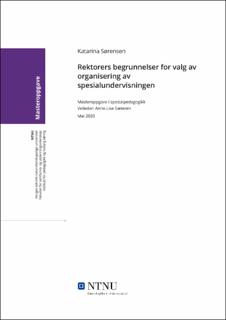| dc.contributor.advisor | Sæteren, Anne-Lise | |
| dc.contributor.author | Sørensen, Katarina | |
| dc.date.accessioned | 2021-09-28T17:36:47Z | |
| dc.date.available | 2021-09-28T17:36:47Z | |
| dc.date.issued | 2020 | |
| dc.identifier | no.ntnu:inspera:53268456:23119467 | |
| dc.identifier.uri | https://hdl.handle.net/11250/2784637 | |
| dc.description.abstract | Denne masteroppgaven tar sikte på å få innsikt i rektorers begrunnelser bak valg av organisering av spesialundervisningen ved deres skole. Formålet er å få en dypere innsikt i hvilke valg som må tas, hvilke vurderinger rektorene gjør seg i denne prosessen og hvorfor de ender opp med en type organisering som de praktiserer i dag. Følgende problemstilling er valgt for denne studien:
Hvilke begrunnelser ligger bak valg av organisering av spesialundervisningen på tre ulike grunnskoler?
Problemstillingen fordrer en kvalitativ forskningstilnærming, fordi jeg i denne studien er opptatt av å gå i dybden på rektorers begrunnelser av valg av organisering av spesialundervisningen. Jeg har intervjuet tre rektorer, fordelt på to kommuner.
Intervjuene dannet grunnlaget for utarbeidelsen av tre hovedkategorier i analysen. Disse er: «For barnets beste», «Inkludering» og «Økonomi.»
Funnene fra intervjuene indikerer at begrunnelsene bak valg av organisering av spesialundervisningen, er nokså like hos de tre rektorene. Det vil si at de omhandler det samme. De er for det første opptatte av å gjennomføre en opplæring som er til det beste for hvert enkelt barn. For det andre ser det ut til at Norges ideologi om inkludering har betydning for hvordan rektorene begrunner valgene. For det tredje viser det seg at økonomi og ressursbruk ligger som et bakteppe når rektorene skal avgjøre hvordan spesialundervisningen skal organiseres. | |
| dc.description.abstract | The aim of this master thesis is to get insight in three principals’ arguments and reasons for how they organize the special education at their schools. The purpose is to get a deeper understanding of which choices that must be made, which evaluation the principals make during this process and why they end up with the special educational practice and organization they practice at their school. The overall research question for this study is:
What are the arguments and reasons for the organization of the special education practice at three different elementary schools?
The overall research question requires a qualitative research approach since the aim is to engage insight and understanding of the principal’s arguments and justifications behind the organization of the special education. To gain this insight and understanding I have interviewed three principals at different schools and from two different counties.
These three interviews constitute the data material in this study and are analysed to gain deeper understanding of the topic in question. The findings from the analysis are presented as three categories: “For the children’s best”, “Inclusion” and “Economy”
These findings indicates that all three of my research participants have common arguments for the organization of the special education at their schools. In other words, they deal with the same challenges. First of all, my analysis shows that the principals are concerned with practicing a special education that is for the individual child’s best. Secondly, it seems like the inclusion ideology in Norway frames and influence how the principals justify their choices and practice. Thirdly, economy and resources are a backdrop for the principal’s decisions on how to organize the special education. | |
| dc.language | nob | |
| dc.publisher | NTNU | |
| dc.title | Rektorers begrunnelser for valg av organisering av spesialundervisningen | |
| dc.type | Master thesis | |
